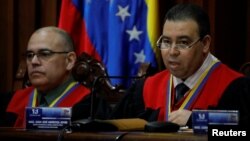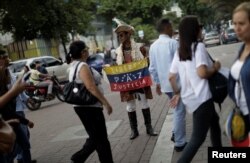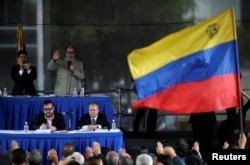Venezuela's opposition-controlled Congress appointed a new slate of judges to the Supreme Court on Friday, a move that the high court immediately voided.
The Supreme Court ruled that the National Assembly's appointment of 13 new judges and 20 substitute judges violated the constitution and was an illegal attempt to usurp authority.
The Congress, which is dominated by the opposition, has been in conflict with the high court judges, who have consistently backed President Nicolas Maduro in the country's political stalemate. Opposition lawmakers see the president's plan to rewrite the constitution as a power grab, while the Supreme Court has supported the effort.
On Thursday, the death toll from four months of anti-government protests in Venezuela topped 100.
Officials said four people were killed Thursday during demonstrations in Valencia, on the outskirts of Caracas, and in northern Zulia state.
One of the victims was a 15-year-old boy who was killed in skirmishes with police in Zuila, as opposition protesters engaged in a 24-hour nationwide strike.
Another man died during anti-government demonstrations just outside Caracas after being shot four times. Authorities said two other men died during demonstrations related to the strike.
Protesters block roads
In cities across Venezuela on Thursday, tree limbs, wires, trash and furniture were transformed into roadblocks as Venezuelans heeded the opposition call to strike against the Maduro government.
Groups of masked young men set fire to a handful of blockades and hurled stones at riot police, who fired back tear gas.
In Caracas, astride a motorcycle and wearing a black helmet, Luis Carmona told VOA he was not going to be swayed by Maduro's overtures.
"What we have here is hunger," he said, "and they [the government] think they are going to buy us off with that little bag of food? No, sir. We are going to keep in the street every day."
The announcement of the additional deaths came after a senior Venezuelan diplomat at the United Nations said he had resigned, citing systematic persecution of civilians, "state terrorism'' and violations of the constitution by the Maduro government.
Speaking to The Associated Press on Thursday night, Isaias Medina said Venezuela "is a failed state," adding that "this is a fugitive government and a complete dictatorship. ... Maduro does not have the right to be in that office.''
Medina, an international lawyer specializing in environmental issues, who was a minister counselor at Venezuela's U.N. mission, called on Maduro to "leave the office so that a new government can take place and do their job.''
Venezuela's U.N. ambassador said Medina was fired for acting dishonestly.
Constitutional assembly
The 24-hour strike was meant as an expression of national disapproval of Maduro's plan to convene a constitutional assembly that would reshape the Venezuelan political system to consolidate the ruling party's power over the few institutions that remain outside its control. The opposition is boycotting a July 30 election to select members of the assembly.
Maduro said on national television that he'd press ahead with plans to rewrite the nation's constitution and that hundreds of Venezuela's largest companies were functioning "at 100 percent'' despite the strike. The claim could not be immediately confirmed.
Violence during four months of anti-government unrest has injured thousands, left hundreds in jail and further damaged an economy in its fourth year of a debilitating decline.
The opposition has called on Venezuelans to take to the streets again on Saturday in a show of support for the new Supreme Court justices they are trying to appoint.
VOA Spanish service correspondent Alvaro Algarra contributed to this report from Caracas.







